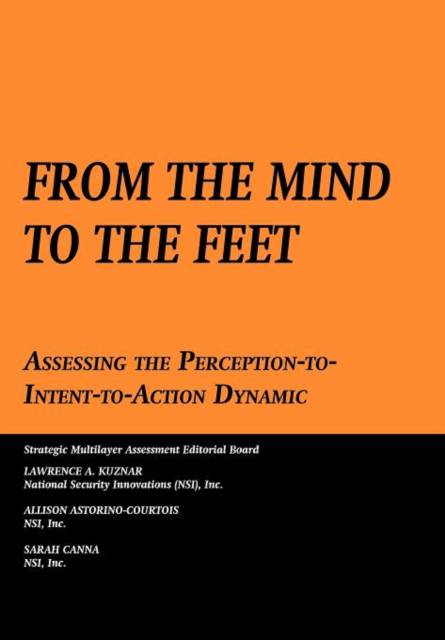
- Afhalen na 1 uur in een winkel met voorraad
- Gratis thuislevering in België vanaf € 30
- Ruim aanbod met 7 miljoen producten
- Afhalen na 1 uur in een winkel met voorraad
- Gratis thuislevering in België vanaf € 30
- Ruim aanbod met 7 miljoen producten
Zoeken
From the Mind to the Feet
Assessing the Perception-To-Intent-To-Action Dynamic
Lawrence A Kuznar, Sarah Canna, Air University Press
Paperback | Engels
€ 30,95
+ 61 punten
Omschrijving
The 12 essays in this volume examine the concept of intent in defense, security, and foreign-policy contexts. They provide operational and academic perspectives on measuring the intent of adversaries, including nation-states and nonstate actors, and understanding the relationship of intent to behavior. The essays apply the insights and methods of multiple disciplines-anthropology, psychology, political science, neuroscience, and others-to the study of intent, for which there is currently no coherent body of research. As Lt Gen Robert Elder, USAF, retired, notes, we are good at estimating an adversary's capabilities but not as good at estimating his intent. To influence an adversary's behavior, we must understand the perception-to-intent-to-action dynamic that underlies his behavior. This collection of essays, which emerged from a Department of Defense Strategic Multilayer Assessment, provides perspectives for doing so. The authors represent multiple agencies and fields of study; some are academics, and some are military subject-matter experts. Their expertise includes decision and behavioral analysis, social psychology, warfare and military strategy, political behavior, applications of neuroscience to behavioral studies, foreign policy, and antiterrorism.
Specificaties
Betrokkenen
- Auteur(s):
- Uitgeverij:
Inhoud
- Aantal bladzijden:
- 192
- Taal:
- Engels
Eigenschappen
- Productcode (EAN):
- 9781780399706
- Verschijningsdatum:
- 1/02/2011
- Uitvoering:
- Paperback
- Formaat:
- Trade paperback (VS)
- Afmetingen:
- 170 mm x 244 mm
- Gewicht:
- 312 g

Alleen bij Standaard Boekhandel
+ 61 punten op je klantenkaart van Standaard Boekhandel
Beoordelingen
We publiceren alleen reviews die voldoen aan de voorwaarden voor reviews. Bekijk onze voorwaarden voor reviews.











